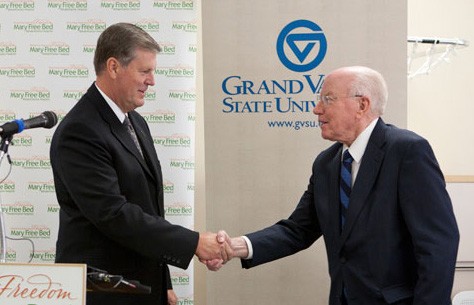University partners with free veteran rehabilitation program

Courtesy Photo / gvsu.edu Grand Valley official discussed the Wounded Warrior Traumatic Brain Injury Project at a news conference on November 9th.
Nov 15, 2010
For injured veterans, the journey does not end once they return home as the road to recovery can be a long and challenging one.
In order to help the recovery process along, a new rehabilitation program is aiming to bring health and support services to Grand Rapids’ wounded soldiers.
Last week, Grand Valley State University and Mary Free Bed Rehabilitation Hospital announced their partnership in the Wounded Warriors Traumatic Brain Injury Project (WWTBIP). WWTBIP offers standard physical and psychological care and community support to veterans who have sustained brain injuries in either Afghanistan or Iraq. All services will be provided to the veterans free of charge through a $1.279 million grant from the U.S. Department of Defense.
MFBRH Chief Psychologist Dr. Jacques Donders said the program’s main goal is to help wounded veterans gain greater hope as they transition back into the community.
“This program is fully customized to meet the unique challenges facing our soldiers who sustained a traumatic brain injury in the Iraq or Afghanistan wars,” Donders said in a press release. “Mary Free Bed Rehabilitation Hospital will provide outpatient rehabilitation services to wounded warriors with traumatic brain injuries addressing their physical, cognitive and psychosocial needs.”
GVSU Vice Provost for Health Jean Nagelkerk will serve as principal investigator for the project. She will oversee research, facilitate development of the educational modules and conduct the evaluation component of the research with co-investigator Donders, who will coordinate the rehabilitation program for the wounded warriors.
Nagelkerk said the program began in response to community inquiries about veteran care.
“Community members who had sons and daughters in the military contacted us to see if there were rehabilitation services available to wounded warriors in the Grand Rapids area,” she said. “Grand Valley State University contacted Mary Free Bed Rehabilitation Hospital to work as partners on the Wounded Warrior Traumatic Brain Injury Project. … GVSU partnered with MFBRH because of their long standing reputation and quality of rehabilitation services.”
With the partnership in place, the university then enlisted Rep. Vern Ehlers, R-Mich., to help secure federal grant funding for the project.
GVSU’s main role in the partnership will be to help develop an educational program to enhance the knowledge base and clinical understanding of the MFBRH staff members that will be in direct contact with the veterans.
“The modules are six weeks in length and include content on physiological symptom control and inter-professional team, cognitive and behavioral health and case management and community reintegration,” Nagelkerk explained. “Next, military health experts will review the education modules to validate the relevance to the treatment of wounded warriors. During the six-week module implementation and until the end of the study, the faculty members will participate in an online discussion board with the MFBRH health professionals to discuss the latest information on these topic areas. MFB health care providers will also participate in high-fidelity simulation courses at GVSU Cook Health Studies building as designed by the module developers.”
Nagelkerk said the program is currently recruiting 17 injured veterans. To be eligible for care, the veterans must have been injured in Iraq or Afghanistan within the past two years. For more information or to enroll, call 888-736-0208, send an e-mail to [email protected] or visit the program’s website at www.maryfreebed.com/woundedwarriors.






















